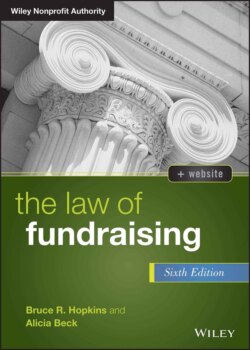Читать книгу The Law of Fundraising - Bruce R. Hopkins - Страница 47
(a) Charitable
ОглавлениеThe function of the states' solicitation statutes is to regulate the process of fundraising for charitable purposes. Thus, the definition of the word charitable is a major factor in establishing the parameters of these laws.1 The meaning of charitable in this context is usually considerably broader than the meaning used in the federal tax setting.2
In general, the law of charity emanates from the English common-law treatment of the term, derived largely from the law pertaining to trusts and property. The meaning of the term charitable under the law of the United States has been—and continues to be—developed largely through interpretations, by the courts and the IRS, of the meaning of the term for purposes of the federal tax exemption and the federal income, estate, and gift tax deductions. State law evolves in a similar fashion, although the term charitable is, as noted, more expansive when used for purposes of the states' charitable solicitation acts.
The word charitable, as employed in the state charitable solicitation act context, is broad and sufficiently encompassing to embrace all categories of organizations that are regarded as charitable entities for federal tax exemption and deduction purposes.3 Therefore, the range of the term encompasses churches, and conventions, associations, integrated auxiliaries, and similar organizations of churches; other religious organizations; schools, colleges, universities, libraries, and museums; other educational organizations; hospitals, hospital systems, clinics, homes for the aged, other health care providers and medical research organizations; other health care organizations; publicly supported organizations of all types; and certain organizations that are supportive of public charities.4
The states, however, in defining the term charitable for purposes of regulating charitable fundraising, often additionally sweep within the ambit of these laws some or all of the following purposes: philanthropic, benevolent, eleemosynary, public interest, social service, social advocacy, humane, voluntary, cultural, environmental, artistic, welfare, patriotic, and recreational. Thus, for example, some states' charitable solicitation acts reach fundraising by organizations that are classified as social welfare organizations for federal tax purposes.5
Some states' laws expressly incorporate within the reach of a charitable solicitation statute one or more purposes that otherwise would not be covered under the most expansive definition of charitable. Thus, a statute may include within its purview solicitations for police, law enforcement, legal defense, or labor purposes. This phenomenon may also be reflected in a statute's exemptions, such as a law exempting unions from the registration requirement imposed on charitable organizations.
Some solicitations by nonprofit organizations for contributions lie outside the range of a state's charitable solicitation act because the gifts are not to be used for charitable purposes. An illustration of this is solicitations of contributions by political organizations or for political campaign purposes.6 For the most part, these unreached solicitations are implicit in a reading of the statute on its face. Sometimes, however, a statute expressly recognizes this fact by means of an exclusion;7 about 10 of these laws are expressly not applicable to solicitations for political purposes.
Some fundraising is undertaken for the benefit of a named individual. It is common for this type of solicitation to be excluded from one or more aspects of regulation. Also, although state regulators disagree on the point, a respectable argument can be made that fundraising for the benefit of one individual is not fundraising for a charitable objective because of the private benefit inherent in the effort. (For federal income tax purposes, an organization benefiting only one individual cannot be a charitable entity.)8
No court opinion generally delineates the ultimate scope of these laws, from the standpoint of the boundaries of the term charitable.9 In general, the government officials interpreting these statutes accord the concept of charitable great latitude when determining their jurisdiction over fundraising regulation matters.
